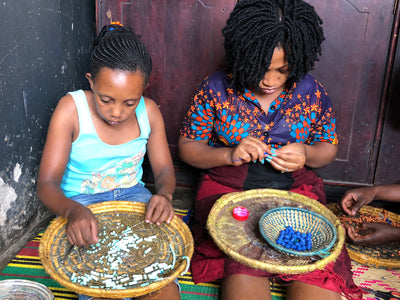Do you Take or Make a Decision? Either Way Let's Go-Tugende!

"To have another language is to possess a second soul" Charlemagne
This morning I read an article in the New York Times about The Beauty of Being Bilingual. While my journey is different than the author of that great article, I still recognize and resonate with several of the key themes about speaking multiple languages. And, while there are so many quotes about languages, I think the quote by Rita Mae Brown sums it up really well "Language is the road map of a culture. It tells you where its people come from and where they are going". And, also the quote by Frank Smith who said "One language sets you in a corridor for life. Two languages open every door along the way".
It's simply beautiful to know multiple languages. It enriches our understanding of cultures, traditions and people. But, most importantly it gives us patience and a better way to communicate, recognizing there are so many ways to say something and also an ability to fill in the blank when someone is missing a word. This ability helps me quite a bit, not only as a professor who teaches many international students but also as a social entrepreneur who interacts with many women from different backgrounds. Also, our Tugende Design team in Jinja for example, speak many different languages but have found ways to communicate and support each other in creative ways.
When I first moved to the U.S. for college, it took a lot of effort to improve my English and it was very frustrating to do the basic things because of language barriers. Simply ordering a hamburger and asking for cucumbers was met with much confusion. Even pointing to the ”pickles” across the counter did not seem to help, just because the person behind the counter didn't think of pickled cucumbers as ”cucumbers" and only knew them as pickles. Small example perhaps, but those of us who are not native English speakers can probably add a long list of those encounters and frustrations.
As I was thinking about it over lunch, I realized most of my friends are also bilingual, even trilingual and likely understand or speak more than just a few words in several additional languages. Perhaps this is the case because so many of my friends are Europeans and Africans where the value and necessity of speaking more languages are so clear. In contrast, my friends and colleagues that are born and raised in the U.S. are less likely to speak multiple languages and generally express less of a curiosity or interest in learning another language. Not a new observation, but an interesting cultural development of a country founded by immigrants.
In my own home here in the U.S., there was a time when we've had multiple languages spoken as my sons were studying Spanish and German in school and I was learning Spanish just for fun. That was of course in addition to me speaking Swedish to my sons when they were young, and English with everyone else. Now I'm learning Luganda, a local language spoken in Uganda. I have come to realize that it's really important for me to know more of the language, even though most people speak English, because of my research and projects and to know the culture better.

If you really think about it, the beauty of speaking more than just one language is more than knowing what to say, or how to say it. When you learn to truly speak another language, you will be much closer to understanding the cultural, traditions and daily practices.
It wasn’t until I started learning Luganda, that I finally understood why it had been so hard for me to order my local food in Kampala (whether in English or Luganda). Turns out that the locals refer to their protein (e.g. chicken, goat, fish) as served in sauce. So when I wanted to order only the ”sauce” with no protein (in places where I was not sure about the quality of the meat), there was mass confusion. Of course this was confusing to the staff because they had no idea what to do. It didn’t occur to them that I just wanted the ”gravy” or ”broth” on my potatoes or rice. It’s just another simple example, but it highlights how it is much easier to navigate an environment when you know the language.
Another issue I’ve been thinking about is how every day expressions are stated in different languages. In English we ”make” a decision but in Swedish we ”take” a decision. I'm often pondering if these variations in expressions signify cultural differences in interpersonal interactions and underlying values. I'm sure people who study languages or linguistics may have something to say about that.
But, on a different note, it was my love for the word Tugende, meaning Let's Go in Luganda that was the foundation for our social enterprise, named Tugende Design. Tugende is such a strong and powerful word. And, it exists in several African languages although pronounced differently in Swahili (spoken in Tanzania and across many African countries) and in Kinyarwanda in Rwanda.
Our mission for Tugende Design, is to go, to make a difference, to serve and to uplift the people that need us. We're starting in Uganda and we support 5 teams of women. These women live in grave poverty and face many hardships but they are also incredibly talented and make beautiful handmade jewelry, bags and crafts that we sell in our online shop Tugende Design, on amazon handmade (with Prime Shipping) and in the local handmade art coop in Atlanta called the Beehive.
So, whether you take or make a decision -Tugende! Let's go and make a difference!


